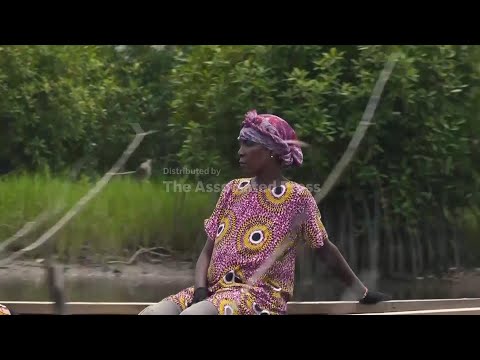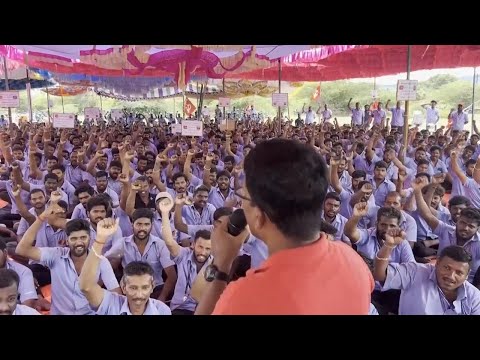(18 Sep 2025)
ASSOCIATED PRESS
Tsokomey, Ghana – 6 August 2025
1. Various oyster Farmer Beatrice Nutekpor crosses the Densu Estuary to farm oysters in the mangroves
2. Close up of crab in the mangroves
3. Various of Nutekpor, and other women harvesting oysters in the water
4. SOUNDBITE (Ga Dialect) Beatrice Nutekpor, Oyster Farmer
“Previously the oysters attach themselves to the mangroves but because the mangroves have been cut now they settle in the water. The oysters have started attaching themselves to the mangroves we have planted. We also harvest the fish that hides in the roots of the mangroves so the mangroves are very good for us.”
5. Various women sort through their catch of oysters
6. SOUNDBITE (Ga Dialect) Beatrice Nutekpor, Oyster Farmer
“Just as my mother taught me this business, I also want to teach my daughter so that she could also teach her child, then oyster farming will become our family’s business."
7. Women bring their catch on shore
8. Various women sort through their catch and cook them over the fire in the Tsokomey community in Greater Accra Region of Ghana
9. SOUNDBITE (English) Promise Hunya, Community Liaison Officer of the Development Action Association
“At first we didn’t know the importance of the mangroves and through the USAID project, and they brought us a student from Cape Coast University to teach us how important the mangrove is.“
10. Various women de-shelling oysters
ASSOCIATED PRESS
Accra, Ghana – 14 August 2025
11. SOUNDBITE (English) Francis K.E. Nunoo, Professor of Fisheries Science, University of Ghana
“So they play an ecological role in being there. If we have more oysters, in a water body, in any mangrove area, it’s found that the water gets cleaner than before.”
ASSOCIATED PRESS
Tsokomey, Ghana – 6 August 2025
12. Various women on a boat through the Densu Estuary to search for oysters in the mangroves
ASSOCIATED PRESS
Accra, Ghana – 14 August 2025
13. SOUNDBITE (English) Francis K.E. Nunoo, Professor of Fisheries Science, University of Ghana
“The reliance of the coastal people on these ecosystems is heavy. So I would also add that we should intentionally find alternative livelihoods for them to help reduce the heavy reliance on mangroves ecosystem, oysters and all the fish and other things that we have because we have a situation where if you don’t take care, the rate of destruction is always higher than the rate of repopulation. We are going to lose some species and we are going to lose some lives."
ASSOCIATED PRESS
Tsokomey, Ghana – 6 August 2025
14. Various women work in the Densu Estuary
15. Mid of women on a boat
STORYLINE:
LEAD IN :
Women are struggling to sustain oyster farming, a key livelihood in coastal mangroves in Ghana.
Programmes that train women to restore mangroves which are so crucial to the ecosystem are no longer running following U.S. aid cuts.
STORYLINE :
Each day Beatrice Nutekpor weaves through the mangroves to harvest oysters for sale.
In Ghana’s coastal mangroves, oyster farming has been a key source of livelihood dominated for ages by women.
Hundreds of women were trained in eco-friendly farming methods for oysters, including mangrove planting and preservation, and selective oyster harvesting, to lessen the impact of climate change.
It’s a family tradition she’s been doing since she was 15.
Now at 45, she is struggling to sustain the practice and pass it to her daughter.
Oyster farming involves breeding oysters in a controlled aquatic environment for commercial purposes.
Find out more about AP Archive: http://www.aparchive.com/HowWeWork
Twitter: https://twitter.com/AP_Archive
Facebook: https://www.facebook.com/APArchives
Instagram: https://www.instagram.com/APNews/
You can license this story through AP Archive: http://www.aparchive.com/metadata/youtube/7e06e71a8e1744e2a53ce85ad178eff3
Author: AP Archive
Go to Source
News post in September 23, 2025, 3:07 am.
Visit Our Sponsor’s:
News Post In – News





